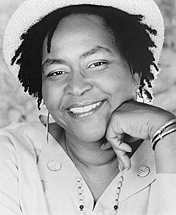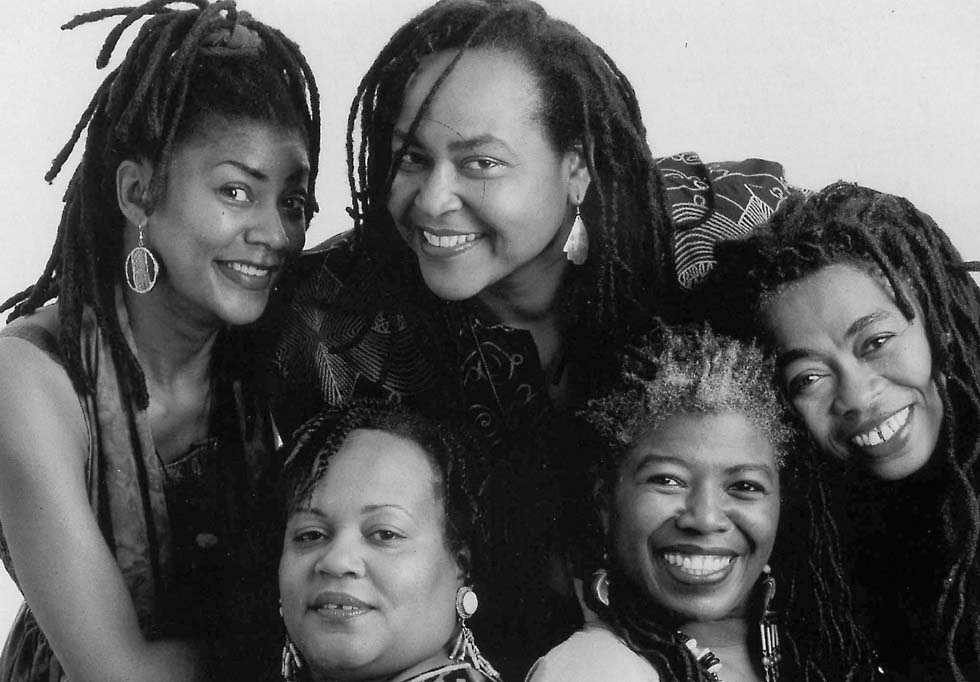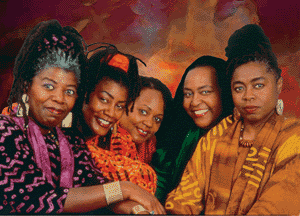 Linda
Tillery Linda
Tillery
Linda Tillery, vocalist, speaker, producer,
arranger and teacher, has dedicated much of the last decade of
her artistic life to the research, teaching and performance of
the great African American oral tradition of song, stick and
story, the ancestor of today's American popular song. In the
1970's and 1980's, Ms. Tillery recorded three albums and became
a key figure in women's music as staff musician and producer for
Olivia Records. Her second solo recording, Linda Tillery, won a
Bammy (Bay Area Music Award) for Best Independently Produced
Album and she was twice named Outstanding Female Vocalist at the
Bay Area Jazz Awards. She has appeared on over 50 recordings by
Santana, Boz Scaggs, Kenny Loggins, Sheila E., Holly Near, Andy
Narrell, Mary Watkins, John Santos, Keith Terry, Turtle Island
String Quartet, Oleta Adams, Huey Lewis & the News, Keola
Beamer, Linda Ronstadt and others.
Ms. Tillery performed in Jukebox, a live radio piece with Danny
Glover, recorded songs for the Marlon Riggs films Color
Adjustment, Fear of Disclosure, and Black Is Black Ain't, and
recorded the soundtrack for the play Letters from a New England
Negro by poet/novelist Sherley Ann Williams. She narrated the
1993 award-winning Pacifica Radio program A Tribute to Audre
Lorde and has cut radio and television commercials for Levis,
PermaSoft and the California Lottery. In 1996 she created the
oral history project, Keep Them With Us, based upon interviews
with elderly African Americans to document traditional African
American song.
Ms. Tillery was an original member of the a cappella ensemble
Voicestra, directed by Bobby McFerrin. She has performed for and
given lecture demonstrations for the Center for Christian
Studies in Toronto, Canada, the New Spirituals Project in
Oakland, California, in Cincinnati, Ohio and at such colleges
and universities as Santa Clara University, Saint Mary's College
in Moraga, California, and Oakland University in Detroit
Michigan.
 The
deeper Linda Tillery pursues her roots, the more her artistry
blossoms. Long regarded as one of the San Francisco Bay Area's
most versatile singers, her powerful and flexible alto has been
a key element in groups ranging from Bobby McFerrin's sublime
Voicestra to the notorious Zazu Pitts Memorial Orchestra. The
deeper Linda Tillery pursues her roots, the more her artistry
blossoms. Long regarded as one of the San Francisco Bay Area's
most versatile singers, her powerful and flexible alto has been
a key element in groups ranging from Bobby McFerrin's sublime
Voicestra to the notorious Zazu Pitts Memorial Orchestra.
In the 1990's Tillery has tapped the diverse resources of
African-American music, from slave songs to modern jazz, to take
command of an even broader repertoire. With a voice that critics
have compared to those of Mahalia Jackson and Aretha Franklin,
Tillery weaves myriad musical threads and cultural traditions
into a stunning single fabric.
"All the music I love and have ever sung is connected," explains
the San Francisco native, "and all of it can be tied together by
following the migration pattern of any African-American family
that started in the South and moved northward to places like
Chicago and New York, and had their lives shaped and dominated
by certain elements -- slavery, religion and survival.
At nineteen Linda Tillery exchanged her classical training for
the role of lead singer in the Loading Zone, a beloved
psychedelic-era Berkeley band that defined itself in terms of
classic Southern soul music. Later she became a key figure in
women's music as staff musician and producer for Olivia Records.
Linda Tillery, her second solo recording, won a Bammy (Bay Area
Music Award) and she was twice named Outstanding Female Vocalist
at the Bay Area Jazz Awards.
Her work in radio includes narrating the award-winning A Burst
of Light for Pacifica, and performing with Danny Glover in
Jukebox, as well as several commercials. Film and theatrical
credits include the soundtrack for Letters from a New England
Negro by Sherley Anne Williams and vocals for Marlon Riggs'
Color Adjustment, Fear of Disclosure and Black Is Black Ain't.
She has also found time to serve on a couple of NEA presenting
and commissioning panels.
 The
Cultural Heritage Choir has led Tillery deeper into
African-American musical history. And yet the music is anything
but dry. "This is not music that calls for people to sing all
the licks they know," she notes. "It's not about anybody's
chops. This is about heart and soul." As Tillery explains, the
central theme is survival. "It is this music, particularly the
spirituals, which has kept black people alive through slavery,
night riders and segregation." Putting together the Cultural
Heritage Choir is "like putting on a pair of shoes that were
made just for you by the best cobbler in the world: they are
comfortable, they are one with your foot, and you can walk all
over God's heaven." The
Cultural Heritage Choir has led Tillery deeper into
African-American musical history. And yet the music is anything
but dry. "This is not music that calls for people to sing all
the licks they know," she notes. "It's not about anybody's
chops. This is about heart and soul." As Tillery explains, the
central theme is survival. "It is this music, particularly the
spirituals, which has kept black people alive through slavery,
night riders and segregation." Putting together the Cultural
Heritage Choir is "like putting on a pair of shoes that were
made just for you by the best cobbler in the world: they are
comfortable, they are one with your foot, and you can walk all
over God's heaven."
Linda Tillery and the Cultural Heritage Choir
In 1992, Linda Tillery came across a treasure
trove of field recordings of traditional African-American music.
Within months, she assembled the Cultural Heritage Choir to
perform spirituals, work and play songs, field hollers and other
slave tunes in the folk tradition.
"I did not know what I was searching for," she
says, "but I knew it would have an historical as well as an
educational focus. I also knew that it would enable me to feel
more complete as an artist and as a human being. I stumbled upon
it and I knew right away that it was right for me."
![[Picture of performer]](../images/tillery.GIF) Today,
the Cultural Heritage Choir-featuring Rhonda Benin, Elouise
Burrell, Melanie DeMore and Emma Foster-Fiege-is one of the most
vital performing groups in its field, bringing traditional forms
of African-American culture to the stage. Solidly rooted in the
past, all the way back to the Gullah culture of the South
Carolina and Georgia Sea Islands, the Choir has a powerful
vision of the future as well. In addition to songs and chants
delivered through such stylistic forms as call-and-response,
multi-layered harmonies, and repetitive verse, the Choir's
repertoire includes intoned sermons, folk tales, polyrhythmic
percussion and dance. Today,
the Cultural Heritage Choir-featuring Rhonda Benin, Elouise
Burrell, Melanie DeMore and Emma Foster-Fiege-is one of the most
vital performing groups in its field, bringing traditional forms
of African-American culture to the stage. Solidly rooted in the
past, all the way back to the Gullah culture of the South
Carolina and Georgia Sea Islands, the Choir has a powerful
vision of the future as well. In addition to songs and chants
delivered through such stylistic forms as call-and-response,
multi-layered harmonies, and repetitive verse, the Choir's
repertoire includes intoned sermons, folk tales, polyrhythmic
percussion and dance.
A San Francisco native and a pioneer of
women's music long heralded for her powerful R&B, jazz, pop and
gospel singing, Tillery says that putting together the Cultural
Heritage Choir to perform spirituals and other forms of
"survival music is like putting on a pair of shoes that were
made just for you by the best cobbler in the world: they are
comfortable, they are one with your foot, and you can walk all
over God's heaven."
Source:
http://www.incentre.net/efmf/performers/tillery.html
http://www.stanford.edu/group/Spirit/tillery.html
http://www.folkloreproductions.com/HTML/tilbio.html
Website:
http://www.culturalheritagechoir.com/
|